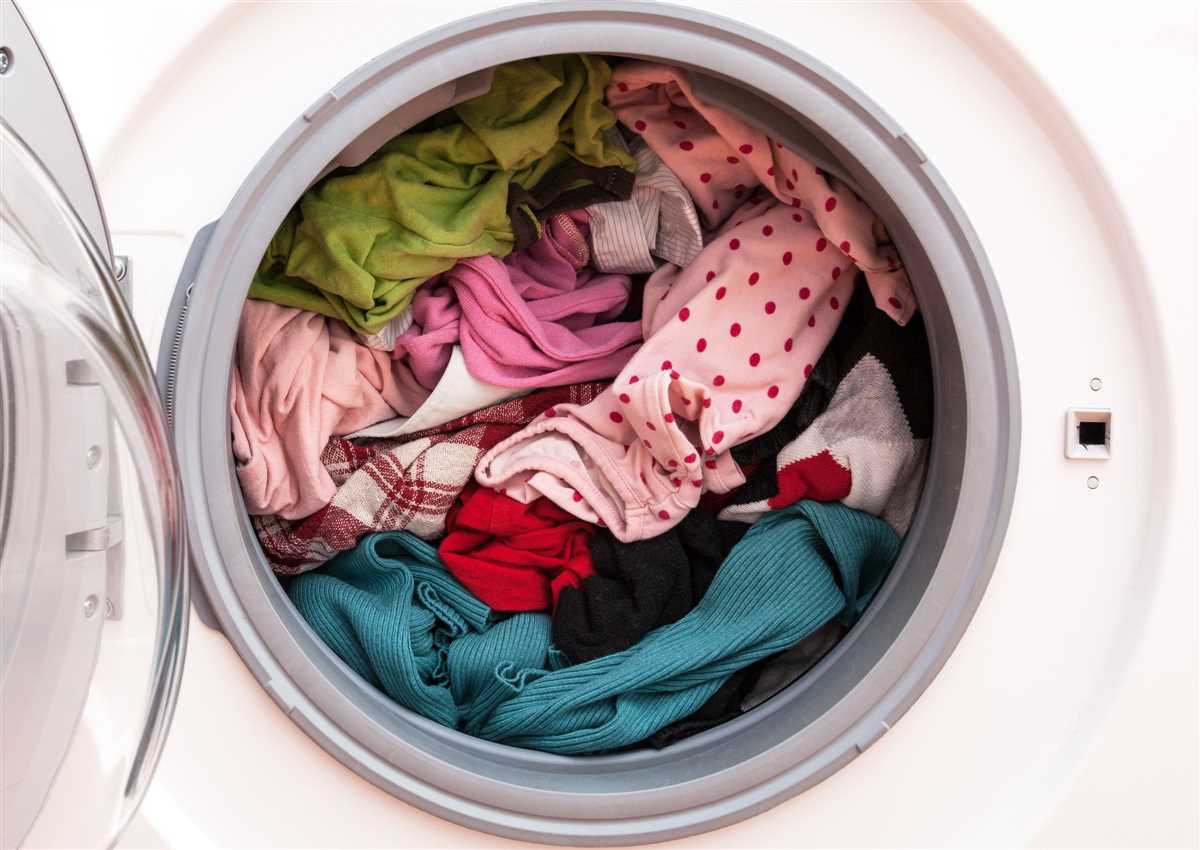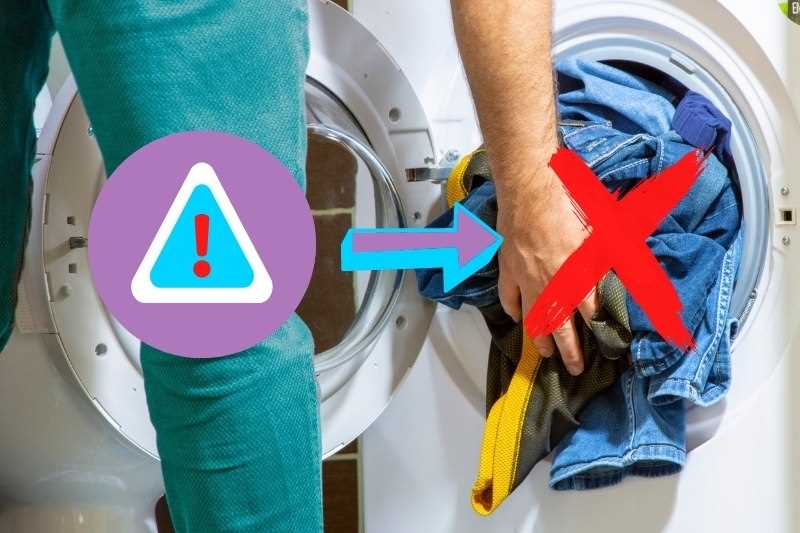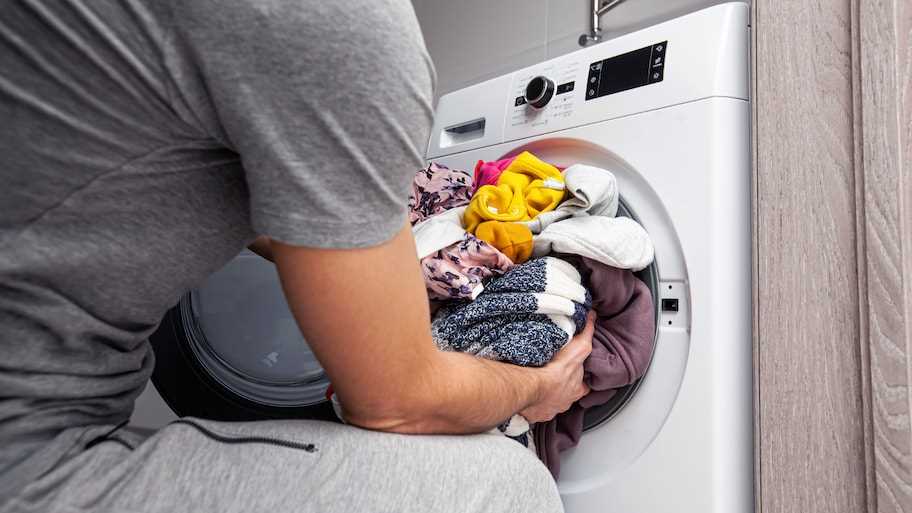




Washing machines have become an indispensable tool in our daily lives. They save us time and effort by taking care of our laundry. However, it’s important to use them correctly to avoid any mishaps. One common mistake that many people make is overloading the washing machine.
When you overload a washing machine, you may think you’re saving time by washing more clothes at once. However, this can have serious consequences. Firstly, overloading can put a strain on the machine’s motor and other components, leading to premature wear and tear. This can shorten the lifespan of the machine and result in costly repairs or replacement.
Additionally, overloading the washing machine can prevent the clothes from getting properly cleaned. The machine needs enough space to agitate the clothes and circulate the water and detergent. When there’s an overload, the clothes can’t move around freely, which means they won’t be cleaned thoroughly. This can result in clothes that still have stains or odors after the wash.
Overloading also affects the efficiency of the washing machine. When there’s too much laundry in the drum, the water and detergent can’t circulate properly. This means that more water and detergent will be needed to get the same level of cleanliness. Not only is this wasteful, but it can also lead to longer wash cycles and higher energy bills.
It’s important to remember that washing machines have specific load capacities for a reason. By following the manufacturer’s recommendations and not overloading your machine, you can ensure that your clothes get clean, the machine operates efficiently, and it lasts for years to come.
What Can Happen When You Overload a Washing Machine?

Overloading a washing machine can lead to a variety of issues and problems. It is important to understand the potential risks and consequences before filling your machine with too many clothes.
1. Inefficient Cleaning:
When you overload a washing machine, the clothes are packed tightly together and the water cannot circulate properly. This can result in inefficient cleaning as the detergent may not be able to reach every garment. As a result, some clothes may come out dirty or with stains still present.
2. Uneven Load Distribution:
Overloading a washing machine can cause an imbalance in the load distribution. This can lead to the machine shaking, vibrating, or even moving across the floor during the spin cycle. The excessive movement can cause wear and tear on the machine and may result in damage or even a breakdown.
3. Damaged Drum:
A overloaded washing machine exerts undue pressure on the drum, which is the central component that holds the clothes. The excess weight and pressure can cause the drum to become misaligned or warped. This can lead to noise, leaks, and even complete failure of the washing machine.
4. Longer Washing Time:
When a washing machine is overloaded, it takes longer for the water and detergent to move through the clothes and properly clean them. This can result in extended washing cycles, causing the machine to run for a longer period of time. Not only does this waste energy and water, but it also puts additional strain on the machine’s motor and other components.
5. Reduced Lifespan:
Overloading a washing machine can significantly reduce its lifespan. The excessive strain and pressure put on the machine’s internal components can cause them to wear out faster. This may result in the need for expensive repairs or even the need to replace the entire machine sooner than expected.
6. Safety Hazards:
Overloading a washing machine can pose safety hazards. The excessive movement and shaking caused by an imbalanced load can cause the machine to tip over or fall off its stand. This can lead to injuries or damage to surrounding objects.
Overall, overloading a washing machine is not worth the risk. It is important to follow the manufacturer’s guidelines and recommendations for load sizes to ensure the best cleaning results and to prevent damage to the machine.
Potential Risks and Consequences of Overloading
While it may be tempting to pile in as many clothes as possible to save time and energy, overloading a washing machine can have several potential risks and consequences:
- Poor cleaning performance: When a washing machine is overloaded, the clothes may not have enough space to move freely and rub against each other. This can result in poor cleaning performance, as the detergent may not be able to effectively reach all areas of the garments.
- Uneven distribution of weight: Overloading can lead to an uneven distribution of weight within the drum. This can cause the washing machine to become unbalanced during the spin cycle, leading to excessive vibrations and potential damage to the machine.
- Damaged or stretched fabric: When clothes are packed tightly together, they can rub against each other more vigorously, which may result in damage or stretching of the fabric. This can lead to premature wear and tear, especially on delicate or more sensitive materials.
- Increased wear on machine parts: Overloading can put additional stress on various parts of the washing machine, such as the motor, bearings, and suspension system. This can lead to increased wear and tear on these components, shortening the lifespan of the machine.
- Potential water leakage: When a washing machine is overloaded, there is a risk of water leakage. The excessive weight can cause excessive strain on the water inlet and outlet pipes, leading to cracks or ruptures that may result in water leakage or flooding.
In order to avoid these potential risks and consequences, it is important to follow the manufacturer’s guidelines and recommendations regarding the maximum load capacity of your washing machine. This can help ensure optimal cleaning performance, protect your garments, and prolong the life of your machine.
Possible Damages to your Washing Machine
- Damaged Drum: Overloading your washing machine can put excessive strain on the drum. This can lead to the drum becoming loose or misaligned, resulting in a noisy and inefficient washing machine.
- Uneven Load Distribution: An overloaded washing machine may not distribute the load evenly. This can cause the machine to vibrate excessively during the spin cycle, leading to potential damage to the motor or other internal parts.
- Torn or Stretched Belts: Overloading the washing machine can put extra pressure on the belts that are responsible for rotating the drum. This excessive strain can lead to belts becoming torn or stretched, affecting the overall performance of the machine.
- Water Leaks: When a washing machine is overloaded, it can put stress on the seals and gaskets. This can result in water leaks during the washing and spinning cycles, potentially causing damage to the internal components and increasing the risk of electrical hazards.
It is important to avoid overloading your washing machine to prevent these possible damages. Always follow the manufacturer’s guidelines regarding the maximum load capacity of your machine, and distribute the laundry evenly to ensure proper functioning and longevity of your washing machine.
Common Mistakes to Avoid When Doing Laundry
1. Overloading the Washing Machine

One of the most common mistakes people make when doing laundry is overloading the washing machine. While it may be tempting to cram as many clothes as possible into one load, overloading the machine can lead to poor cleaning results and potential damage to the machine.
2. Ignoring the Manufacturer’s Instructions
Each washing machine comes with specific instructions from the manufacturer. Ignoring these instructions can result in damage to the machine or ineffective cleaning. It is important to read and follow the manufacturer’s instructions to ensure the machine works properly and efficiently.
3. Using the Wrong Detergent
Using the wrong detergent can also lead to problems when doing laundry. Some detergents are designed for specific fabrics or types of stains, and using the wrong detergent may not remove stains effectively or could damage certain fabrics.
4. Not Sorting the Laundry
Sorting the laundry is an essential step in the laundry process. Not sorting the laundry can result in colors bleeding, whites becoming grey, or delicate fabrics becoming damaged. It is important to separate clothes by color, fabric type, and washing instructions to avoid these issues.
5. Overusing Detergent or Fabric Softener
Using too much detergent or fabric softener can leave residues on the clothes and within the washing machine. This can cause clothes to feel stiff or sticky and can lead to buildup within the machine, affecting its performance.
6. Neglecting to Clean the Washing Machine
Regularly cleaning the washing machine is often overlooked but is an important step in maintaining its performance and longevity. Neglecting to clean the machine can result in unpleasant odors, mold growth, and decreased efficiency.
7. Not Checking Pockets
Forgetting to check pockets before washing can result in damage to both the clothes and the machine. Items such as tissues, coins, or keys can cause clogs, tearing, or damage to the machine’s drum.
8. Overlooking Stain Treatment
Not treating stains before washing can lead to them setting into the fabric or becoming more difficult to remove. It is important to identify and treat stains before washing to increase the chances of successful stain removal.
9. Using Excessive Heat
Using excessively high heat settings when drying clothes can cause shrinkage, fading, and damage to certain fabrics. It is important to follow the recommended heat settings for different fabric types to avoid these issues.
10. Neglecting to Empty the Lint Trap
Not emptying the lint trap in the dryer can result in reduced airflow, longer drying times, and a potential fire hazard. It is important to clean the lint trap after each use to ensure optimal performance and safety.
By avoiding these common mistakes, you can ensure that your laundry is done effectively, efficiently, and without any unnecessary damage to your clothes or washing machine.
Tips to Properly Load your Washing Machine

Properly loading your washing machine is important to ensure effective cleaning and to prevent damage to both your clothes and the machine. Here are some tips to help you load your washing machine correctly:
1. Sort your clothes
Before loading the machine, sort your clothes according to color and fabric type. This helps to prevent color bleeding and damage to delicate fabrics.
2. Check the machine’s capacity
Every washing machine has a specified capacity based on weight. Make sure you do not overload the machine as this can affect the performance and efficiency of the wash. Refer to the manufacturer’s guidelines to determine the maximum load capacity.
3. Distribute the weight evenly
When loading your machine, distribute the weight of the clothes evenly. Uneven loads can cause the machine to become unbalanced, leading to excessive vibrations and potential damage.
4. Close zippers and secure buttons
Before loading your clothes, make sure to close zippers, fasten buttons, and secure any loose accessories. This helps to prevent damage to both your clothes and the machine.
5. Use a laundry bag for small items
If you have small items such as socks or lingerie, consider using a laundry bag to keep them contained during the wash cycle. This helps to prevent them from getting lost or tangled with larger clothing items.
6. Follow detergent guidelines
Be sure to follow the manufacturer’s guidelines when determining the amount of detergent to use. Using excessive detergent can lead to residue buildup and poor rinsing, while using too little may result in poor cleaning.
7. Avoid overloading with water
Do not overload the machine with excessive water. Overloading can lead to poor agitation and rinsing, resulting in inefficient cleaning. Refer to the machine’s water level guidelines for optimal performance.
8. Clean the machine regularly

To maintain your washing machine in optimal condition, clean it regularly. This helps to remove dirt, lint, and detergent residue from the drum and prevents unpleasant odors.
Following these tips will help you load your washing machine properly, ensuring clean and well-maintained clothes. Remember to always refer to the manufacturer’s guidelines for specific loading instructions.
Importance of Following Manufacturer’s Guidelines
When it comes to using household appliances, it is important to follow the manufacturer’s guidelines. This is especially true for washing machines, as failing to do so can result in damage to the machine and potentially dangerous situations.
The manufacturer’s guidelines provide important information about how to properly set up, operate, and maintain the washing machine. These guidelines are developed based on the machine’s design, features, and intended use.
One of the key aspects addressed in the manufacturer’s guidelines is the capacity of the washing machine. Each machine is designed to handle a specific load size, and exceeding this capacity can lead to problems. Overloading the machine can put excessive strain on the motor, drive belt, and other components, potentially causing them to wear out faster or even break. It can also result in poor cleaning performance and inefficient water and energy usage.
Furthermore, overloading a washing machine can also affect the balance of the load. When a load is too large, it may become unbalanced during the spin cycle, causing the machine to vibrate excessively. This can not only damage the machine itself, but also the surrounding area and any items placed on top of the machine.
Following the manufacturer’s guidelines also ensures that you use the appropriate type and amount of detergent for your machine. Using too much detergent can result in excessive suds and poor rinsing, while using too little may not effectively clean your laundry.
In addition, the guidelines provide important information about maintenance and care. This includes regular cleaning of the machine, checking for and removing any lint or debris from the filters, and scheduling professional servicing if needed. By following these recommendations, you can extend the lifespan of your washing machine and ensure its optimal performance.
- Always read and keep the manufacturer’s manual for reference.
- Check the recommended load capacity for your washing machine.
- Use the appropriate type and amount of detergent.
- Follow the recommended maintenance and care procedures.
In conclusion, it is crucial to follow the manufacturer’s guidelines when using a washing machine. By doing so, you can avoid overloading the machine, prevent damage, and maintain its efficiency and longevity. Taking the time to read and understand these guidelines will ultimately save you time, money, and potential frustration in the long run.
FAQ
What happens if I overload my washing machine?
If you overload your washing machine, it can lead to insufficient cleaning. The clothes may not have enough space to move around freely, resulting in a poor wash. In addition, overloading can put a strain on the machine’s motor and other components, potentially causing damage and reducing the lifespan of the appliance.
Can overloading a washing machine cause it to leak?
Yes, overloading a washing machine can cause it to leak. When you overload the machine, the excess weight puts pressure on the drum and the door seal. This pressure can cause the seal to become displaced or damaged, leading to leaks during the wash cycle. It’s important to follow the manufacturer’s guidelines for load capacity to avoid any potential leakage issues.
Why is it important to avoid overloading a washing machine?
It is important to avoid overloading a washing machine because it can damage the machine and reduce its efficiency. Overloading can strain the motor and other components, causing them to wear out faster. It can also lead to insufficient cleaning, as the clothes won’t have enough space to move around freely. Additionally, overloading can increase the risk of leaks and other mechanical issues.
How can overloading a washing machine affect the quality of the wash?
Overloading a washing machine can affect the quality of the wash by preventing proper agitation and movement of the clothes. When the machine is overloaded, the clothes can’t circulate freely in the water, resulting in poor cleaning. The detergent may not be evenly distributed, and some areas of the load may not receive enough water or detergent, leading to uneven or ineffective cleaning.
Can overloading a washing machine damage the clothes?
Yes, overloading a washing machine can damage the clothes. When the machine is overloaded, the clothes can become tangled and twisted, increasing the risk of stretching, tearing, or snagging. The excessive weight and lack of space for movement can also cause excessive friction and agitation, potentially damaging delicate fabrics or embellishments on the garments.
What happens if you overload a washing machine?
If you overload a washing machine, it can cause several issues. Firstly, the machine may not be able to properly clean your clothes as they won’t have enough room to move around. This can result in clothes coming out still dirty or with detergent residue. Secondly, overloaded machines put excessive strain on the motor and other components, leading to increased wear and tear. Over time, this can cause the machine to break down sooner than expected. Additionally, an overloaded machine may become unbalanced during the spin cycle, causing it to shake violently and potentially damage the machine or surrounding surfaces.












